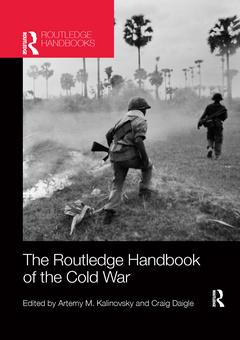The Routledge Handbook of the Cold War

This new Handbook offers a wide-ranging overview of current scholarship on the Cold War, with essays from many leading scholars.
The field of Cold War history has consistently been one of the most vibrant in the field of international studies. Recent scholarship has added to our understanding of familiar Cold War events, such as the Korean War, the Cuban Missile Crisis and superpower détente, and shed new light on the importance of ideology, race, modernization, and transnational movements.
The Routledge Handbook of the Cold War draws on the wealth of new Cold War scholarship, bringing together essays on a diverse range of topics such as geopolitics, military power and technology and strategy. The chapters also address the importance of non-state actors, such as scientists, human rights activists and the Catholic Church, and examine the importance of development, foreign aid and overseas assistance.
The volume is organised into nine parts:
- Part I: The Early Cold War
- Part II: Cracks in the Bloc
- Part III: Decolonization, Imperialism and its Consequences
- Part IV: The Cold War in the Third World
- Part V: The Era of Detente
- Part VI: Human Rights and Non-State Actors
- Part VII: Nuclear Weapons, Technology and Intelligence
- Part VIII: Psychological Warfare, Propaganda and Cold War Culture
- Part IX: The End of the Cold War
This new Handbook will be of great interest to all students of Cold War history, international history, foreign policy, security studies and IR in general.
Introduction, Craig Daigle andArtemy M. Kalinovsky Part I: The Early Cold War 1. Incompatible Universalisms: The United States, the Soviet Union, and the Beginning of the Cold War, Mario Del Pero 2.Fear, Want, and the Internationalism of the Early Cold Warm, Amanda Kay McVety 3. The Early Cold War and its Legacies, Vojtech Mastny Part II: Cracks in the Bloc 4. Polish Communism, the Hungarian Revolution, and the Soviet Union, Anita J. Prazmowska 5. Berlin and the Cold War Struggle over Germany, Hope M. Harrison 6. The Sino-Soviet Split, Lorenz M. Lüthi Part III: Decolonization and its Consequences 7. Decolonization and the Cold War, Ryan M. Irwin 8.Vietnam and the Global Cold War, Jessica M. Chapman 9. Modernization and Development, Nathan J. Citino Part IV: The Cold War in the Third World 10. The Cold War in Latin America, Tanya Harmer 11. The Cold War in Africa, Jeffrey James Byrne 12. The Cold War in the Middle East, Paul Thomas Chamberlin 13.The Cold War in South and Central Asia, Artemy M. Kalinovsky Part V: From Confrontation to Negotiation 14.The Era of Détente, Craig Daigle 15.Zhou Enlai and the Sino-American Rapprochement, 1969-1972, Yafeng Xia 16. The Conference on Security and Cooperation in Europe: A Reappraisal, Angela Romano Part VI: Human Rights and Non-State Actors 17. Human Rights and the Cold War, Sarah B. Snyder 18. U.S. Scientists and the Cold War, Paul Rubinson 19. The Catholic Church and the Cold War, Piotr H. Kosicki Part VII: Nuclear Weapons, Technology, and Intelligence 20.Nuclear Weapons and the Cold War, Ruud van Dijk 21.Technology and the Cold War, Elidor Mëhilli 22. Intelligence and the Cold War, Ben De Jong Part VIII: Psychological Warfare, Propaganda, and Cold War Culture 23. Propaganda and the Cold War, Nicholas J. Cull and B. Theo Mazumdar 24. Cold War and Film, Andrei Kozovoi 25. Soviet Studies and Cultural Consumption, Sergei I. Zhuk Part IX: The End of the Cold War 26. Explanations for the End of the Cold War, Artemy M. Kalinovsky and Craig Daigle 27.Humanitarian Aid, Soft Power, and the End of the Cold War in Poland, Gregory F. Domber 28.Neoliberalism, Consumerism and the End of the Cold War, David Priestland
Artemy M. Kalinovsky is Assistant Professor of East European Studies at the University of Amsterdam, and is author of A Long Goodbye: The Soviet Withdrawal from Afghanistan (2011) and co-editor of The End of the Cold War in The Third World (Routledge, 2011). Craig Daigle is Associate Professor of History, The City College of New York, CUNY, and is author of The Limits of Détente: The United States, the Soviet Union, and the Arab-Israeli Conflict, 1969-1973 (2012).
Date de parution : 07-2016
17.4x24.6 cm
Date de parution : 05-2014
Ouvrage de 364 p.
17.4x24.6 cm
Disponible chez l'éditeur (délai d'approvisionnement : 14 jours).
Prix indicatif 281,07 €
Ajouter au panierThèmes de The Routledge Handbook of the Cold War :
Mots-clés :
FNLA; Cold War; NATO’s Dual Track Decision; geopolitics; Humanitarian Aid; military power; Infi Ghting; technology; Nuclear Disarmament; strategy; West Germany; Polska Zjednoczona Partia Robotnicza; Nick Cullather; Soviet General Secretary Brezhnev; Laser Guided Bombs; DRV; Tsar Alexander III; Rock Music; NATO Integrate Command Structure; SED Leadership; SED Regime; ABM Treaty; Live Tv Show; NATO’s Integrate Military Command; CIA Analyst; CIA’s Involvement; Komitet Gosudarstvennoy Bezopasnosti; Soviet Television; Yemeni Socialist Party



